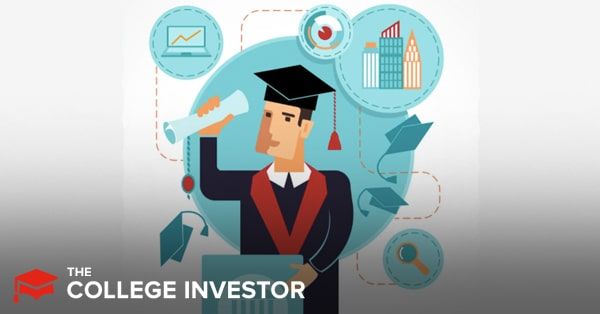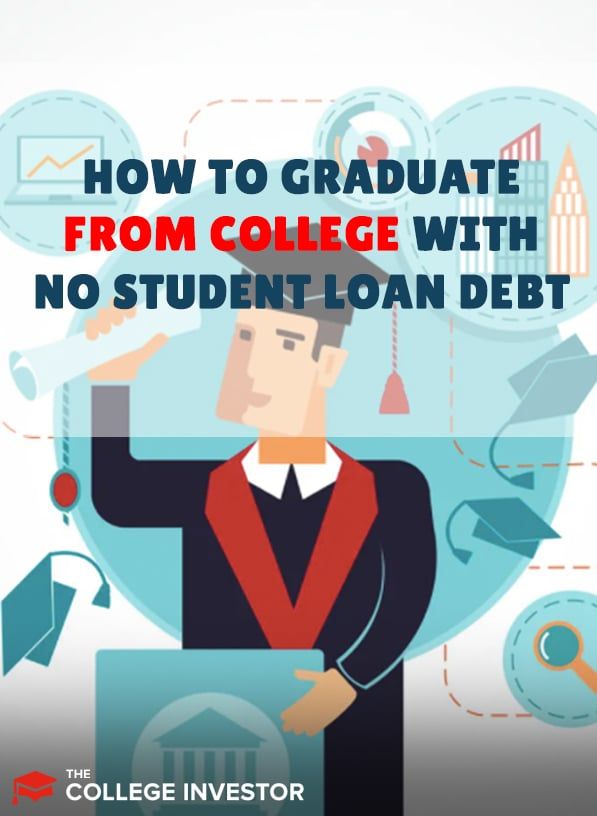
Overall, 38% of undergraduate students graduate college without student loan debt.
This includes a third of students in Certificate programs, more than half (52%) of students in Associate’s degree programs and less than a third (31%) of students in Bachelor’s degree programs.
There are several ways you can increase your chances of graduating without any student loans, based on an analysis of data from the 2015-16 National Postsecondary Student Aid Study. We dive into the details below.
Study Smart
Students with a better grade point average (GPA) in college are less likely to graduate with student loan debt, as shown in this table. There is a similar correlation between high school GPA and graduating with no loans.
College Grade Point Average | % of All Undergraduate | % of Students In Bachelor’s |
|---|---|---|
Lower than 2.50 | 35% | 21% |
2.50 - 2.99 | 37% | 26% |
3.00 - 3.49 | 38% | 32% |
3.50 or higher | 42% | 37% |
Almost three quarters (74%) of students who graduate with no debt have a 3.00 or higher college GPA.
Curiously, students who take college classes in high school or AP classes are just as likely to graduate with no student loan debt as students who don’t. Students who take International Baccalaureate (IB) classes, however, are more likely to graduate with no debt, 40% vs. 33%.
Major In Mathematics Or Architecture
Almost half of students who obtain a Bachelor’s degree in mathematics or statistics (47%) or architecture and planning (48%) graduate with no student loan debt. More than half of students who get a Bachelor’s degree in economics (51%) or philosophy (52%) graduate with no student loan debt.
This compared with education and healthcare, where less than a quarter (24%) of Bachelor’s degree recipients graduate with no student loan debt.
Attend On-Campus Classes
A third of students who took no distance education classes graduated with no student loan debt, while only a quarter of students whose entire Bachelor’s degree program was provided through distance education were able to avoid debt. This statistic is a bit surprising as distance education courses are often advertised as more economical.
Participate In Study Abroad Programs
Roughly 40% of students who participate in study abroad programs graduate with a Bachelor’s degree and no student debt compared to 30% of students who don't participate in these programs. Students who participate in study abroad programs also have a higher adjusted gross income (AGI) than students who don’t.
Money Matters
As this table shows, undergraduate students with parents who have an adjusted gross income (AGI) of $100,000 or more are more likely to graduate with no student loan debt.
Adjusted Gross Income (AGI) | % With No Debt |
|---|---|
Lower than 2.50 | 35% |
2.50 - 2.99 | 37% |
3.00 - 3.49 | 38% |
3.50 or higher | 42% |
Four-fifths of undergraduate students who graduated with no debt received financial help from their parents. Among students in Bachelor’s degree programs who graduated with no debt, 87% received financial help from their parents.
Students whose parents have doctoral degrees, such as PhDs and MDs, are more likely to graduate with no debt, perhaps because their parents tend to be wealthier.
Become Financially Literate
Around 36% of students who answered three financial literacy questions correctly graduated without student loan debt, compared with 29% of other students.
Similarly, 36% of students who don't carry a balance on their credit cards graduate with no student loan debt. This compares with less than a quarter (22%) of students who don't pay off their credit cards in full each month.
Related: 10 Best Personal Finance Books (That Will Change Your Life)
Establish Financial Security
A student’s ability to come up with $2,000 in the next month correlates strongly with whether the student graduates with no debt, as shown in this table.
Financial Security: $2,000 Within The Next Month | % With No Debt |
|---|---|
Certainly could come up with the $2,000 | 47% |
Probably could come up with the $2,000 | 30% |
Probably could not come up with the $2,000 | 22% |
Certainly could not come up with the $2,000 | 17% |
This statistic make sense as it's an indicator of the "margin" that a student has in their finances and the ability to cover financial stressors without borrowing.
So, for example, if you're able to build up some emergencies cash reserves by working some summer jobs or side hustles throughout your high school years, it could significantly help you avoid student debt during college.
Impact Of College Choice
We talk a lot about the importance of school choice if you want to minimize student debt. And the data from NPSAS:16 once again shows how this decision can impact your finances during your collegiate years.
Choose A College With A Lower Net Price
Net price is the difference between the cost of attendance and all grants. It's the discounted sticker price, the amount that the student will have to pay from savings, contributions from income, and student loans.
As the net price decreases, the student will be better able to cover college costs with resources other than loans.
Net Price | % With No Debt |
|---|---|
Zero | 60% |
$1 to $5,599 | 40% |
$5,600 to $10,899 | 31% |
$10,900 to $18,799 | 25% |
$18,800 or more | 33% |
More than three quarters (79%) of undergraduate students who graduated with no debt enrolled in colleges with tuition and fees less than $10,000. Among students in Bachelor’s degree programs, more than half (56%) of the students who graduated with no debt enrolled in colleges with tuition and fees less than $10,000.
More than half (53%) of undergraduate students and more than a third (36%) of students in Bachelor’s degree programs who graduated with no debt enrolled in colleges with a net price less than $10,000.
Students are more likely to graduate with no debt at colleges with generous “no loans” financial aid policies. These colleges replace loans with grants in the financial aid packages of students with demonstrated financial need. Likewise, students are more likely to graduate with no debt at colleges with a lower cost of attendance, such as in-state public colleges.
College Affordability
When tuition is a lower percentage of income, the student is more likely to graduate with no debt, as shown in this table.
Tuition As % Of Income | % With No Debt |
|---|---|
0% | 67% |
1% to 25% | 35% |
26% to 50% | 30% |
51% to 75% | 27% |
76% to 100% | 28% |
There is a similar result based on the college affordability index, as shown in the next table. The college affordability index is the net price after grants as a percent of income. A lower college affordability index leads to a lower likelihood of graduating with student loan debt, especially when the college affordability index is less than 25%.
College Affordability Index | % With No Debt |
|---|---|
0% | 61% |
1% to 25% | 37% |
26% to 50% | 28% |
51% to 75% | 28% |
76% to 100% | 27% |
Cut College Costs By Living At Home With Your Parents
Half (50%) of undergraduate students who live at home with their parents graduate with no debt, compared with 36% of students who live on-campus. However, they're less likely to graduate.
Enroll At An Out-Of-State College, But Only If You Can Afford It
Almost half (49%) of students pay out-of-state tuition graduate with no loans, compared with less than a third (31%) of students who pay in-state tuition. Even though out-of-state tuition is higher, wealthier students are more likely to enroll in an out-of-state college.
Live In The Right State
Students who live in certain states are more likely to graduate with no debt. These states include Alaska (58%), California (39%), Florida (40%), Hawaii (44%), Louisiana (37%), New Mexico (36%) and Utah (36%).
Don’t Enroll At For-Profit Colleges
A third of students at public 4-year colleges (34%) and private non-profit 4-year colleges (31%) graduate with no debt, compared with 14% of students at private for-profit 4-year colleges.
Among all undergraduate students, 81% of students who graduated with no debt enrolled at public colleges, compared with 13% at private non-profit colleges and 6% at for-profit colleges. (79% of the students enrolled in public colleges who graduated with no debt were in-state students.)
Among students in Bachelor’s degree programs, two-thirds (68%) of students who graduated with no debt were enrolled at public colleges, more than a quarter (28%) were enrolled at private non-profit colleges, and only 4% were enrolled at for-profit colleges.
Enroll At A Very Selective College
Students who enroll at the most selective colleges are more likely to graduate with no loans, in part because these colleges have more generous financial aid policies.
Selectivity (4-Year Nonprofit Institutions) | % With No Debt |
|---|---|
Not public or private nonprofit 4-year | 14% |
Very selective | 44% |
Moderately selective | 29% |
Minimally selective | 23% |
Open admission | 34% |
Impact Of Financial Aid
When many students think of "financial aid," they think of loans. But there are many types of financial aid that don't involve debt. And, in fact, these resources can play a critical role in helping college students avoid taking out student loans.
File The FAFSA
Students who apply for federal student aid by filing the Free Application for Federal Student Aid (FAFSA) are actually much less likely to graduate with no student loan debt, 15% vs. 66%.
Why is this the case? Well, first of all, not filing the FAFSA is often an indicator of wealth. Students who receive a Federal Pell Grant, for example, are also much less likely to graduate with no student loans, 16% vs. 39%.
Second, students who don’t file the FAFSA are also ineligible for federal student loans, making it more difficult for them to borrow.
Go To College At The Same Time As Siblings
More than a third (39%) of students who have siblings in college graduate with no loans, compared with less than a third (31%) of students who do not have siblings in college.
This may be due to financial aid formulas that divide the parent contribution portion of the expected family contribution (EFC) by the number of children in college.
This may change in 2024-2025, though, when the simplified FAFSA will drop this aspect of the federal need analysis methodology.
Win Private Scholarships
Students who win private scholarships are less likely to graduate with student loan debt, especially students who win at least five figures in scholarships.
Roughly 42% of students who win more than $10,000 in private scholarships graduate with no debt, compared with 31% of students who don’t win any scholarships. More than half (56%) of students who win more than $25,000 in private scholarships graduate with no student loan debt.
Impact Of Student Characteristics
Wondering how factors like your age and marital status impact your odds of graduating college with student debt? We break down the data below.
Age
Younger, more traditional college students, are more likely to graduate with no debt. More than a third (36%) of students age 15-23 when they graduate with a Bachelor’s degree graduate with no debt, compared with less than a third of students age 24-29 (27%) and age 30 and older (21%).
Dependency Status
More than a third (34%) of dependent students graduate with no debt, compared with about a quarter (27%) of independent students.
Marital Status
A third (32%) of students who are single graduate with no debt, compared with 29% of students who are married and 23% of students who are separated.
Children And Other Dependents
About a quarter (26%) of students who have dependents graduate with no debt, compared with about a third (32%) of students who do not have any dependents.
Military Status
Almost half (46%) of students who are serving on active duty in the U.S. Armed Forces graduate with no debt. This compares with a third (34%) of veterans and less than a third (31%) of students with no military service.
Related: The Ultimate Guide To Military And VA Education Benefits To Pay For College
Race
Black or African-American students are less likely to graduate with no debt, while Asian students are more likely to graduate with no debt, as shown in the next table.
Race/Ethnicity (With Multiple) | % With No Debt |
|---|---|
White | 31% |
Black or African American | 15% |
Hispanic or Latino | 34% |
Asian | 55% |
American Indian or Alaska Native | 24% |
Black or African-American students who enroll at Historically Black Colleges and Universities (HBCUs) are also slightly less likely to graduate with no debt, 11% vs. 16%.
Gender
Men are more likely to graduate with no loans than women (34% to 29%). This trend is especially prevalent among:
- Less selective colleges
- Older non-traditional students (age 30 and older)
- Married students
- Students who have dependents
- Students who are serving on active duty in the U.S. Armed Forces.
There are also some academic majors in which there is a significant difference by gender, as shown in this table.
Academic Major | % of Men With No Loans | % of Women With No Loans |
|---|---|---|
Agriculture | 28% | 45% |
Architecture | 36% | 65% |
Computer And Information Sciences | 33% | 19% |
General Studies | 39% | 24% |
History | 27% | 43% |
Liberal Arts | 45% | 24% |
Physical Sciences | 42% | 24% |
Public Administration/Social Services | 49% | 20% |
Final Thoughts
Some of the factors listed above, like your age and race, are obviously out of your control. But other factors, like the school you attend or the major your select, are your personal choices.
Pay attention to the areas that are within your sphere of influence and do whatever you can to minimize your chances of needing to take out student loans during college. Even if you can't avoid student debt completely, mindfulness can help you take out fewer loans than you would have otherwise.
Finally, realize that taking out some student loans during college isn't the end of the world. With the right student loan repayment strategy, you can effectively manage your student debt after you graduate even while you work towards your other financial goals.

Mark Kantrowitz is an expert on student financial aid, scholarships, 529 plans, and student loans. He has been quoted in more than 10,000 newspaper and magazine articles about college admissions and financial aid. Mark has written for the New York Times, Wall Street Journal, Washington Post, Reuters, USA Today, MarketWatch, Money Magazine, Forbes, Newsweek, and Time. You can find his work on Student Aid Policy here.
Mark is the author of five bestselling books about scholarships and financial aid and holds seven patents. Mark serves on the editorial board of the Journal of Student Financial Aid, the editorial advisory board of Bottom Line/Personal, and is a member of the board of trustees of the Center for Excellence in Education. He previously served as a member of the board of directors of the National Scholarship Providers Association. Mark has two Bachelor’s degrees in mathematics and philosophy from the Massachusetts Institute of Technology (MIT) and a Master’s degree in computer science from Carnegie Mellon University (CMU).
Editor: Robert Farrington Reviewed by: Chris Muller
